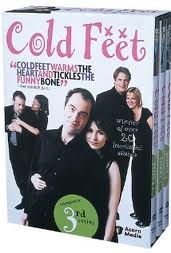
Here's what I said.
For me a lot of the success behind Cold Feet was the choice and blend of characters which permitted excellent comedy writing and of course the writer's brilliant wit. Comedy was the big seller in that, I'd say.
The issue you're discussing here is the well night impossible question to answer of 'what makes a good series?' . While we can't really answer that, what we can do is be very tough about staying on task during development, trying to isolate and hang on to what we think is the big seller. One thing I created when I was working on devising TV drama series was something I called 'The Series Template', and a lot of people have found it useful. It's an extra bit to go in the bible, but it precedes the bible. It's essentially, 'what you have to get in each episode', and it covers specific character interaction, type of structure, style etc - all in one sentence grabs. The great thing about the Series Template is that you can create it very early on in the development process so it help in development (when it's really easy for discussion to go off the point), but also for ongoing use. I've written about the Series Template in a book on TV I wrote called 'TV Writing: The Ground Rules of Series, Serials and Sitcom' It's now available as an ebook.
(Television Writing: The Ground Rules of Series, Serials and Sitcom)
It's a bit out of date but constantly pirated so someone must be finding it useful.
One of the biggest problems we have as writers is staying on task - we'rewriters, we're inventive - we can easily get distracted away from writing Little Red Riding Hood by getting really interested in Little Red Riding Hood's wacky Auntie. Great, but that ain't the job description. So a constant reminder of 'what am I supposed to be doing here' is immensely useful.
There is also a general need for new series arc each season to stop atrophy. So, how? In practical, technical terms? Now that TV is delighting viewers by breaking new ground in things structural (you can barely watch an evening's TV drama these days without seeing flashbacks, time jumps etc) one way that I suggest is the use of a range of nonlinear series arcs. Technically difficult, but I've recently given talks to TV writers in Poland and at the BBC TV Drama Writers' Festival on exactly that, and there's a lot of interest because, as you rightly point out, there's always a need to punch up drama series before they get tired (and as quickly as possible when they do).
 RSS Feed
RSS Feed


